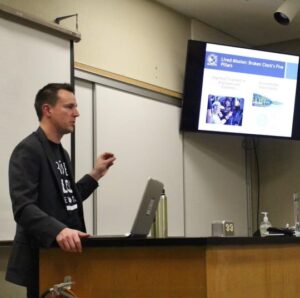Many of us have worked at businesses where one person makes all the decisions and everyone else follows along without knowing too much about how the organization actually runs.
That’s not the way they do things at Broken Clock Brewing Cooperative, where founder and operations manager Jeremy Mathison has opted to take a different, more collaborative approach.
 “I like to practice open book management, which is really the idea of involving your staff and your employees in the entire process of your organization,” said Mathison, who established Broken Clock – Minnesota’s only fully community owned cooperative brewery – in 2015. “And the great thing about it is that if it’s done right, you have so much more buy-in and so many more people invested in the success of the business.”
“I like to practice open book management, which is really the idea of involving your staff and your employees in the entire process of your organization,” said Mathison, who established Broken Clock – Minnesota’s only fully community owned cooperative brewery – in 2015. “And the great thing about it is that if it’s done right, you have so much more buy-in and so many more people invested in the success of the business.”
At Broken Clock, department heads are encouraged to get involved in all aspects of the day-to-day operations of the company. They’re taught everything from how to use financial statements to develop a budget to strategies for hiring and training new team members. Armed with this deep level of knowledge, they’re empowered to make their own decisions and unless he absolutely has to intervene, Mathison stays out of the way.
Running a business this way can be “very scary” for entrepreneurs who are used to a more traditional management style, Mathison said, but if you can find the right people, the payoffs can be huge for everyone not only financially but also in terms of personal satisfaction and fulfillment.
“So many times a job can just sort of drain everything out of you because you feel like you’re just a cog in the machine making money for somebody else,” he said. “We’ve worked hard to create a business where people can be proud to say ‘I was a part of this.’”
Plus, having about a dozen craft beers on tap doesn’t hurt, either.
If you’re a business owner who’s considering implementing open book management at your company, here are Mathison’s thoughts:
Be able to leave your ego at the door
“A lot of what open book management is is giving up that control you’ve worked so hard to put into place,” Mathison said. “And for a lot of business owners, that can be really tough.” Before fully diving into this leadership model, do some reflection. Is delegating something that comes naturally to you? Are you OK with allowing other people to make decisions? Would not being involved in every aspect of management stress you out? There are no right or wrong answers here. It’s simply about understanding what you’re comfortable with.
Hire people who want to take on the mindset of an owner
During a job interview, many candidates say that they want to be involved in the inner workings of the company even if they don’t mean it. “Everybody will tell you ‘that’s right up my alley,’” Mathison said. “But the reality is I don’t think that it’s up the alley of a lot of people because it does take a lot of extra work and a lot of that work goes unnoticed.” While there’s no foolproof way to determine whether candidates will ultimately live up to the promises they make during the interview, Mathison said one key thing to look for up front is their attitude toward others.
“In the beginning, our biggest struggle was that we hired employees who did want to be empowered but they didn’t necessarily view people as an asset,” he said. “However, when you create a business, you need to recognize that your employees are your number-one asset. Had we focused on that from the beginning, we probably would have done our hiring a little bit differently.”

Don’t be afraid to break the mold
When looking to hire new people, it’s easy to post a job description online and wait for the responses to roll in. On the flip side, it’s equally easy for prospective employees to apply for jobs this way and many of them are skilled in drafting resumes that include all the popular buzzwords. However, who they say they are on paper doesn’t always translate to reality. That’s why Mathison recommends searching for new hires in different ways.
See a barista at Starbucks who is providing outstanding service? Encourage her to apply for a position at your company. Ask your friends and fellow business owners if they know anyone who’s looking for a job. “You should be looking for talent wherever you go,” he said. “And you shouldn’t be afraid to take a chance on someone who doesn’t fit the textbook definition of the hire you’re trying to make.”
In the end, it all comes down to trust.
In order for open book management to be successfully implemented, trust is key. That means trusting yourself to hire the right people and then in turn placing your trust in them to get the job done, even if they don’t do things exactly the way you would. “You have to trust that they can make decisions based on the information that’s in front of them and the education you’ve given them,” he said.
Abra Kadabra Environmental Services is proud to share the wisdom of business owners from our community through our thought leadership series. If you’d like to be featured, click here.

